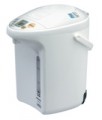Temperature adjustment
The temperature adjustment capabilities refer to the specific temperature values that can be programmed into the electric kettle. It's important to note that this refers to automatic adjustment, where the kettle turns off or switches to temperature maintenance mode once the desired temperature has been reached.
If this paragraph contains several options separated by commas (for example, “60 °С, 80 °С, 90 °С”), this means that this model has several fixed temperature options. However, there are also devices with
smooth adjustment, which allows you to adjust the temperature in steps of 5 °C, or even 1 °C; for such devices, the entire adjustment range is indicated here, for example, "60 — 100 °C".
The greater the number of temperature setting options available in an electric kettle, the more versatile it becomes, allowing for precise selection of the optimal brewing mode for various types of drinks. Here is a simple table of recommended temperatures:
—
white tea — 60 °C;
—
yellow tea -70 °C;
—
green tea — 80 °C;
—
black tea — 90 °C;
— rooibos, hibiscus — 100 °C (up to boiling);
—
baby food — 40 °C.
Of course, there are exceptions to such rules — depending on the specific type of drink. For example, some
...varieties of green tea can be brewed at 90 °C.Thermometer
A device that displays the temperature of the water in the kettle. The presence of a
thermometer is useful if the water needs to be heated to a certain temperature. However, the thermometer does not automatically turn off the kettle, unlike a thermostat — this must be done manually. Also, the thermometer allows you to assess how much the heated water has cooled over time and whether it can be used without heating again.
Delay start timer
A function that allows you to pre-set
the start time of the kettle. For example, you can pour water in the evening and set a timer for the morning, so that by the time you woke up, it has just boiled. This eliminates the need to turn on the kettle manually and wait for the water to heat up.
Water supply
—
Water supply button. The electric pump button is used to control the built-in pump in the kettle, which is responsible for supplying water to the spout. It is considered to be the most advanced method of water supply as it requires no manual effort from the user, can work with any container, and allows for accurate measurement of the required volume. Some models even provide automatic dosing where the electric pump dispenses a strictly defined volume of liquid with just the touch of a button. However, these supply systems are more expensive and require a power supply, which can be a disadvantage for some users.
—
Hand pump. The mechanical pump with a manual drive is integrated into the lid of the thermopot and is operated by a large button. This type of pump is simple, inexpensive, and does not require electricity to function, which is beneficial in case of power outages. However, it is not very convenient since multiple presses are required to fill even a small cup, and it is difficult to accurately measure the amount of water dispensed. As a result, it is typically used in conjunction with more advanced systems rather than being the sole method of dispensing water.
—
Cup pressing. This method is also known as the "cup-activated dispensing system". It uses an electric pump, similar to the button systems described earlier, but the switch for the pump
...is located near the spout and is activated by the cup's edge instead of by hand. This makes it easy to dispense water by simply bringing the cup to the spout and pressing the switch with the cup's edge. However, this method is not suitable for certain types of cups such as soft plastic or paper cups, and holding the cup while dispensing can be inconvenient as the hot water can burn one's hand through the walls of the cup. Therefore, this method is often combined with a traditional serving button to provide users with the most convenient option for their situation.Blocking the water supply
A feature found mainly in thermopots and hot water dispensers. Recall that in such devices, water is supplied from a special spout at the touch of a button or lever (for more details, see "Water supply"). And
blocking the water supply is useful primarily for families with small children — so that a curious baby does not get burned by turning on the water without adult supervision. The method of turning on and off the lock is selected in such a way as not to cause difficulties for an adult and at the same time be inaccessible to a child; a typical example is the simultaneous pressing of a pair of buttons on the control panel.

